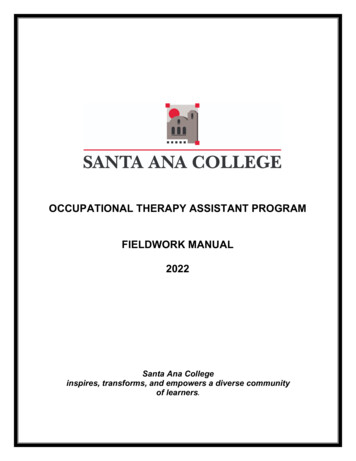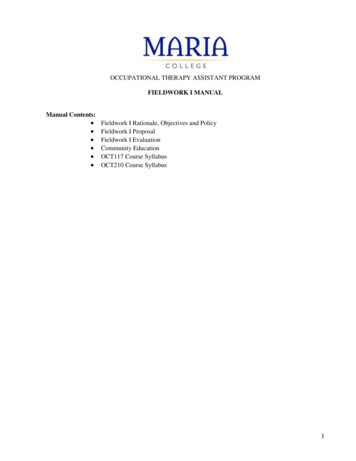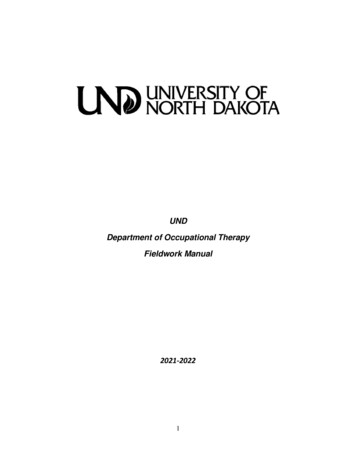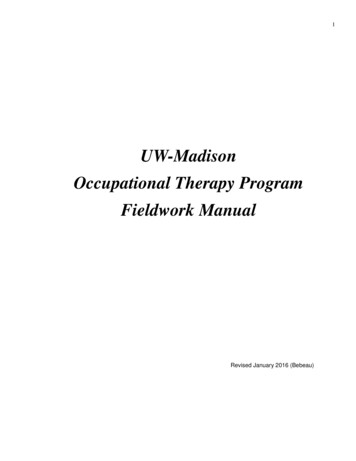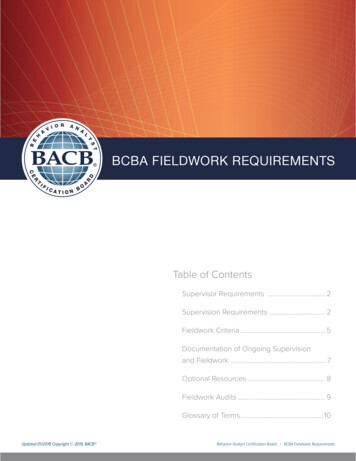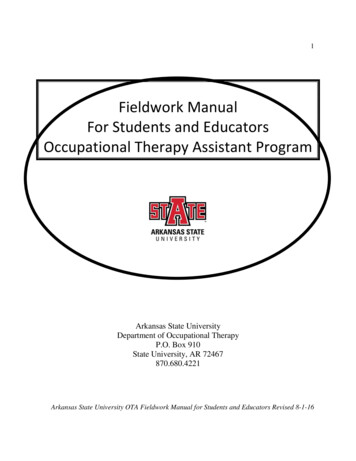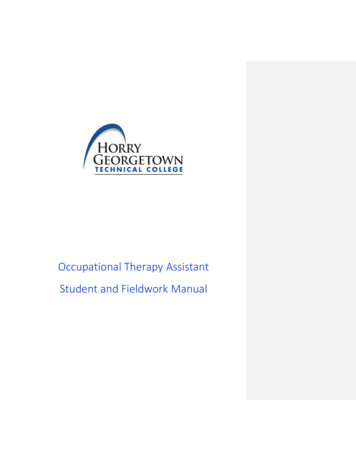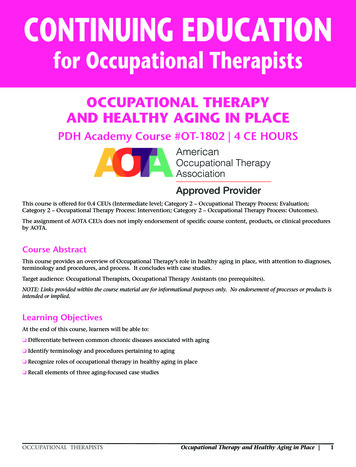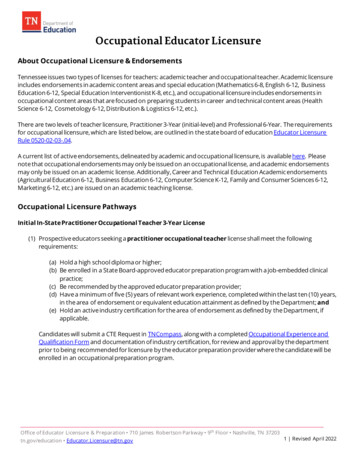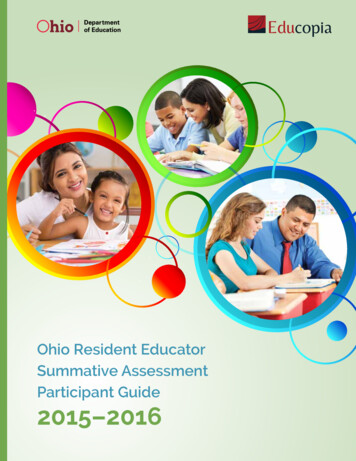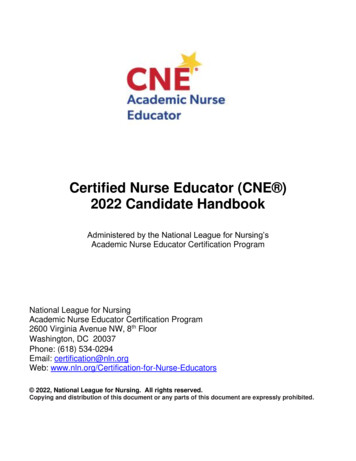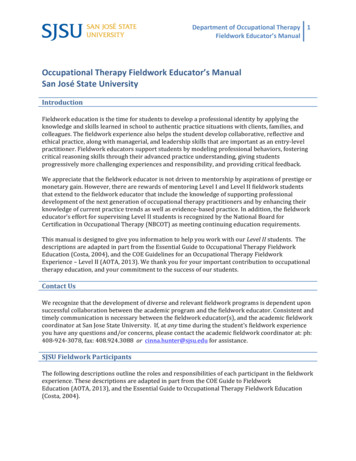
Transcription
Department of Occupational Therapy 1Fieldwork Educator’s ManualOccupational Therapy Fieldwork Educator’s ManualSan José State UniversityIntroductionFieldwork education is the time for students to develop a professional identity by applying theknowledge and skills learned in school to authentic practice situations with clients, families, andcolleagues. The fieldwork experience also helps the student develop collaborative, reflective andethical practice, along with managerial, and leadership skills that are important as an entry-levelpractitioner. Fieldwork educators support students by modeling professional behaviors, fosteringcritical reasoning skills through their advanced practice understanding, giving studentsprogressively more challenging experiences and responsibility, and providing critical feedback.We appreciate that the fieldwork educator is not driven to mentorship by aspirations of prestige ormonetary gain. However, there are rewards of mentoring Level I and Level II fieldwork studentsthat extend to the fieldwork educator that include the knowledge of supporting professionaldevelopment of the next generation of occupational therapy practitioners and by enhancing theirknowledge of current practice trends as well as evidence-based practice. In addition, the fieldworkeducator’s effort for supervising Level II students is recognized by the National Board forCertification in Occupational Therapy (NBCOT) as meeting continuing education requirements.This manual is designed to give you information to help you work with our Level II students. Thedescriptions are adapted in part from the Essential Guide to Occupational Therapy FieldworkEducation (Costa, 2004), and the COE Guidelines for an Occupational Therapy FieldworkExperience – Level II (AOTA, 2013). We thank you for your important contribution to occupationaltherapy education, and your commitment to the success of our students.Contact UsWe recognize that the development of diverse and relevant fieldwork programs is dependent uponsuccessful collaboration between the academic program and the fieldwork educator. Consistent andtimely communication is necessary between the fieldwork educator(s), and the academic fieldworkcoordinator at San Jose State University. If, at any time during the student’s fieldwork experienceyou have any questions and/or concerns, please contact the academic fieldwork coordinator at: ph:408-924-3078, fax: 408.924.3088 or cinna.hunter@sjsu.edu for assistance.SJSU Fieldwork ParticipantsThe following descriptions outline the roles and responsibilities of each participant in the fieldworkexperience. These descriptions are adapted in part from the COE Guide to FieldworkEducation (AOTA, 2013), and the Essential Guide to Occupational Therapy Fieldwork Education(Costa, 2004).
Department of Occupational Therapy 2Fieldwork Educator’s ManualThe academic fieldwork coordinator is the faculty person from the San Jose State UniversityOccupational Therapy program who serves as a liaison between the academic setting, the fieldworksite, and the student. The primary responsibilities of the academic fieldwork coordinator are: Assignment of eligible students to a fieldwork experience and confirmation of assignment inwriting to each fieldwork site Initiation and maintenance of written contracts or letters of agreement between theeducational institution and the fieldwork site* Maintenance of current files on each fieldwork site, including up to date fieldwork data forms,and facility forms Identification of new sites for fieldwork placement Orientation of students to the purpose of the fieldwork experience, instructing them on theirroles and responsibilities, and providing them with any required forms Collaboration with the fieldwork placement site, including providing information on policies forwithdrawal or failure of a student Communication through use of forms, student information packets, written, and verbal orelectronic communication techniques to the fieldwork site.* A contract or facility agreement between the University and the clinical site must be in placebefore beginning any student placement. The academic fieldwork coordinator will initiate thecontract/Memoranda of Understanding (MOU) process with you. The contract must be signed bythe appropriate authority at your facility and returned to the institution for processing. You willalso be emailed a Fieldwork Data Form, which requests general information about your facility, thesetting, client population served, assessments and interventions, theoretical models, prerequisitesfor the student program, student information, and staffing profile. This form is to be completed andreturned to the academic fieldwork coordinator. The information provided on this form serves as adatabase regarding your facility. The students have access to this information in preparation for thefieldwork experience.The clinical fieldwork coordinator, also known as the student coordinator, is the individual atthe clinical site responsible for the administrative functions of the site's fieldwork program.Depending on site regulations and/or business model, the owner or fieldwork educator may also bethe individual designated to perform these functions. The administrative duties of the clinicalfieldwork coordinator include: Collaborating with academic fieldwork coordinator for the development and implementation,(and when necessary, revision) of a meaningful fieldwork programPreparing, maintaining, and sending to the academic fieldwork coordinator information aboutthe fieldwork placement site, including if the facility belongs to a larger organization, and/orfacility-specific application requirementsEstablishing a student fieldwork program, usually in collaboration with other staff, whichincludes objectives of the fieldwork experience and student manual with goals, expectations,assignments, and additional fieldwork program requirementsObtaining from the academic program policy pertaining to withdrawal of a student from thefieldwork experienceScheduling students in collaboration with the academic fieldwork coordinator
Department of Occupational Therapy 3Fieldwork Educator’s Manual Informing the academic fieldwork coordinator if student interviews are required prior toconfirmationNotifying the academic fieldwork coordinator of confirmation of student placementOrganizing student's orientation to clinical setting and providing information such as health,safety and education requirements, work hours, dress code, and expectationsAssigning students to a fieldwork educator and forwarding this information (includingfieldwork educator credentials and license number) to the academic fieldwork coordinatorMeeting periodically with the fieldwork educator(s) and the student to assess progress anddiscuss any issues and or concernsNotifying the academic fieldwork coordinator if concerns arise with a student that might lead toa failure or withdrawal from the fieldwork experienceReviewing mid-term and final evaluations with the fieldwork educator and the studentDetermining that final evaluation forms are complete, signed, and that the originals are mailedto the academic fieldwork coordinatorPeriodically reviewing contractual agreement between the fieldwork site and the academicinstitution, making sure these agreements are signed and up-to-date.The fieldwork educator, clinical supervisor, preceptor, or student supervisor, is the individualresponsible for direct student training at the fieldwork placement site. For Level II fieldwork, theclinical supervisor must be a registered Occupational Therapist with a minimum of one year ofclinical experience in a practice setting. The responsibilities of the fieldwork educator include thefollowing: Direct day-to-day supervision of the student Clearly defining expectations to the student Assigning clients to the student Supervising the student in the provision of OT services (evaluation, intervention,documentation, and oral reporting) Assessing the skill and knowledge level of the student Meeting regularly with the student to review performance and provide feedback Notifying the clinical fieldwork coordinator and the academic fieldwork coordinator if thestudent is not meeting expectations or problems arise Evaluating the student at mid-term and at the end of the fieldwork experience, identifyingstrengths, areas to work on, and methods to achieve success in these areas.According to the COE Guidelines for an Occupational Therapy Fieldwork Experience – Level II(2012):There are multiple sources of supervision guidelines that are applicable to Level IIfieldwork. The first sources are state laws and state practice acts that govern the practice ofoccupational therapy. These documents will specify if there are any specific requirementsfor supervision that need to be upheld in that state. Another source of supervisionguidelines are federal regulations such as Medicare that specify what type of supervisionmust be provided to fieldwork students in certain healthcare settings and with certain typesof Medicare coverage. The AOTA Website is a good source for the most up-to-dateinformation on Medicare regulations for student supervision. The ACOTE Standards specifythat during Level II fieldwork, students must be supervised by a licensed or credentialedoccupational therapy practitioner with at least 1year of experience who is adequately
Department of Occupational Therapy 4Fieldwork Educator’s Manualprepared to serve as a fieldwork educator. Further, the Standards state that supervisionshould initially be direct, and then progress to less direct supervision as is possible giventhe demands of the fieldwork site, the complexity of the client’s condition being treated, andthe abilities of the fieldwork student. The COE and Commission on Practice (COP) FieldworkLevel II position paper (COE/COP, 2012) additionally recommends that supervision ofoccupational therapy, and occupational therapy assistants in fieldwork Level II settings willbe of the quality and scope to ensure protection of consumers and provide opportunities forappropriate role modeling of occupational therapy practice and that the supervisingoccupational therapist and/or occupational therapy assistant must recognize when directversus indirect supervision is needed and ensure that supervision supports the student’scurrent and developing levels of competence. (COE/COP, 2012)The student is expected to collaborate with both the academic fieldwork coordinator and thefieldwork educator to ensure compliance with fieldwork experience requirements. Specificresponsibilities include: Attending fieldwork orientation meeting conducted by the academic fieldwork coordinator,which provides a description of fieldwork expectations, registration procedures, policies forwithdrawal, repetition and grading of the fieldwork experience, certification examinationprocedures and licensure procedures Providing a completed personal data sheet, resume, and copy of health record to FieldworkCoordinator Completing all site requirements/preparation prior to commencing the fieldwork experience,and providing student health records, background check (if required), and CPR training recordsto the clinical setting Providing the contact information for the student’s academic advisor to the fieldworkeducator(s) Exhibiting professional behavior at all times during the clinical affiliation (i.e. arriving to workon time, following protocols as outlined by the facility, communicating in a professional mannerwith the supervisor and other professional staff at the fieldwork site, taking responsibility forhis/her own work schedule, completing required assignments and duties in a timely manner) Active participation in the supervisory process, utilizing available resources, and takingresponsibility for his/her own learning Maintaining copies of performance evaluation forms and student evaluations forms of thefieldwork placement, and ensuring that the final evaluations have been received and reviewedby the fieldwork coordinatorPalladino and Jeffries (2000) have developed a workbook designed to facilitate students takingresponsibility for learning in Level I and Level II fieldwork. The book includes many forms whichthe student, clinical or academic supervisor can utilize to document skills, knowledge and clinicalexperience. Other student resources include: Occupational Therapy Fieldwork Survival Guide(Napier-Tibere & Haroun, 2004), and The Successful Occupational Therapy Fieldwork Student(Sladyk, 2002).
Department of Occupational Therapy 5Fieldwork Educator’s ManualSJSU Occupational Therapy Curriculum, Themes and Student ObjectivesThe curriculum is organized around the core principle of participation in occupation to promotehealth, wellbeing, and social inclusion. The curriculum is designed to enable students to acquire theknowledge and competencies necessary to become qualified as a generalist in occupational therapypractice within four semesters of graduate academic study and six months of supervised fieldworkexperience.A lifespan orientation to occupational therapy practice was chosen rather than organizationaccording to traditional practice areas in order to emphasize the holistic nature of contemporarypractice. Course content addressing professional behaviors and research/evidence-based practiceprovided throughout the curriculum assists students in advancing critical analysis and leadershipskills.The curriculum is composed of six clusters:1.2.3.4.5.Occupation—the core of the professionFoundations for occupational therapy practiceProfessional developmentPractice in the CommunityResearch and knowledge development6. Practice of occupational therapy.Six curricular threads reflect knowledge and skills that run through all courses in the curriculum.They include the following:1.2.3.4.5.6.Integrating affective experiences: Skills in perceiving, understanding, and responding to theemotional contexts of interactions and performance of self and othersEmbracing diversity: Self-reflection and awareness of one’s own identity, values, attitudes,and prejudices. Skills in perceiving, understanding, respecting, and responding to others’diverse experiences, values, attitudes, and prejudicesDeveloping professional identity & leadership capacity: Understanding oneself as aprofessional through self-reflection, development of professional behaviors andengagement in professional activitiesBecoming creators of knowledge: Understanding the development of knowledge and howone can contribute to the evolution of knowledge. Be a self-directed, independent learnerand scholarUnderstanding humans as occupational beings: Knowledge of the complexity anduniqueness of occupation in the human experience and the facilitation of occupationalparticipationEngaging and serving communities of practice, scholarship, and learning: Connecting,collaborating, and serving department, university, local, and global communities.
Department of Occupational Therapy 6Fieldwork Educator’s ManualCurriculum Learning Outcomes1. Demonstrate effective oral and written communication skills2. Demonstrate a capacity for problem solving and critical analysis3. Understand and be able to articulate the nature of occupation, adaptive skills, and rolesof productive living4. Understand occupational therapy’s theoretical base and models of practice5. Articulate the importance of history and the philosophical base of the profession6. Demonstrate knowledge and appreciation of the roles of sociocultural, socioeconomic,diversity factors, and lifestyle choices in contemporary society7. Demonstrate the ability to apply occupational therapy theory, and standardized andnon-standardized evidence-based assessments of clients’ performance in all areas ofoccupation to achieve expected outcomes related to occupation8. Provide occupationally-based interventions determined by the needs of the client andthe evaluation data, in collaboration with members of the intervention team (client,family, caregivers, and health care providers)9. Demonstrate professional behavior that upholds the ethical standards, values, andattitudes of the profession in establishing and maintaining a therapeutic relationshipwith clients10. Demonstrate basic qualitative and quantitative research skills11. Exhibit the ability to use appropriate advocacy and educational methods to address theneeds of consumers12. Apply principles of management and service delivery in the provision of occupationaltherapy to individuals and organizations.Level II Fieldwork Student ObjectivesDuring each fieldwork experience, the student will:1. Demonstrate appropriate workplace behaviors at all times (getting to work ontime, adhering to facility dress codes, as well as follow all procedures directed bythe fieldwork site)2. Identify his/her professional knowledge, skills and behaviors, and work tostrengthen performance3. Identify his/her own learning style and use the fieldwork experience as alaboratory to continue the educational process in occupational therapy practice4. Apply academic knowledge to the clinical interventions with clients5. Recognize the theoretical intervention models used in the assigned agency andapply these models in practice6. Collaborate with his/her supervisor in developing learning objectives to meethis/her individual needs7. Assume responsibility to access the resources necessary to planning andperforming assigned duties8. Assume increasing amounts of responsibility for the care of clients, graduallyrequiring less supervision. At the end of the fieldwork experience, students
Department of Occupational Therapy 7Fieldwork Educator’s Manualshould have the skills of a beginning therapist in that setting9. Report orally on designated clients to supervisor, occupational therapycolleagues, and other staff members10. Submit complete and timely documentation, adhering to customary policy(ies) ofthe fieldwork site11. Develop interpersonal relationships conducive to therapeutic goals on a one-toone (and group basis, if applicable)12. Utilize constructive feedback to develop a professional identity congruent withthe ethics of the helping professions, yet unique to the individual practitioner;and13. Meet the specific behavioral objectives as written by the assigned agencyFieldwork ProcessesTwo levels of fieldwork education are established in the Standards of an Accredited EducationalProgram for the Occupational Therapist (Accreditation Council for Occupational Therapy Education,2012).Level I fieldwork is designed to develop a basic comfort level with and understanding of the needsof the clients. Level II fieldwork is required and designed to develop competent, entry-level,generalist occupational therapists.Level II fieldwork: The Level II fieldwork experience shall be integrated into the program’scurriculum design, and shall include an in-depth experience in delivering occupational therapyservices to clients. Students will focus on the application of purposeful and meaningful occupationand research, and the administration and management of occupational therapy services. It isrecommended that the student be exposed to a variety of clients across the life span and to a varietyof settings. The fieldwork experience shall be designed to promote clinical reasoning and reflectivepractice. It should also transmit the values and beliefs that enable ethical practice, and to developprofessionalism and competence.The SJSU Occupational Therapy Level II fieldwork requirements correspond with the AccreditationCouncil for Occupational Therapy Education (ACOTE) Standards and Interpretive Guide (AOTA,2011). Students are required to complete a minimum of six months of Level II fieldwork; generally12 weeks in two clinical settings totaling 24 weeks of mandatory full-time experience.The student may complete the Level II fieldwork experience in only one setting or a maximum offour different settings. This may also be on a full or part-time basis, but may not be less than halftime as defined by the fieldwork site. The settings may be traditional and/or emerging practicesettings. Even if the setting is not a classically defined psychosocial placement, psychological orsocial factors that influence client engagement in occupation should be understood and integratedinto the student’s experience. According to the Accreditation Council for Occupational TherapyEducation (ACOTE) Standards and Interpretive Guide (2011), “ one fieldwork experience (eitherLevel I or Level II) has as its focus psychological and social factors that influence engagement inoccupation.”
Department of Occupational Therapy 8Fieldwork Educator’s ManualThe student shall be supervised by an Occupational Therapist who meets state regulations forlicensure (with at least 1 year full-time or its equivalent of practice experience subsequent to initialcertification), and who is prepared to be a fieldwork educator. In a setting where there is nooccupational therapist on site (ie, and emerging practice setting), the program must document thatthere is a plan for the provision of occupational therapy services. On-site supervision must complywith the plan and state credential requirements. The occupational therapist must have at least 3years’ full-time or its equivalent of professional experience. The student must receive a minimum of8 hours of occupational therapy direct supervision per week, including direct observation of clientinteraction. Additionally, the clinical supervisor must be readily available for communication andconsultation during work hours, and there must be an on-site supervisor designee while theoccupational therapist is of-site. The supervisor designee may be from another profession. Suchfieldwork shall not exceed 12 weeks.During each clinical fieldwork experience, the student is assigned an academic advisor. Thisperson may be the academic fieldwork coordinator or another faculty member from the academicprogram. The academic advisor is responsible for checking on the student's status during theaffiliation. Typically, the academic advisor will contact the student and the clinical supervisor at themid-term of the fieldwork experience. If problems or concerns are expressed at the time of contact,it is the academic advisor's responsibility to provide suggestions for resolution and to follow-up asappropriate with the student, fieldwork educator, and academic fieldwork coordinator.Students are expected to meet all site requirements for their initial preparation including but notlimited to health requirements (including all vaccinations and proof thereof), background checks,drug screens, respirator fit tests, HIPPA and other site training/orientation documentation at theircost (unless the facility provides on-site preparation activities). Generally, the student isresponsible for providing their health records directly to the clinical site. SJSU requires a studenthealth record to include: Last physical examination, Hepatitis B series, MMR, Chicken Poxvaccination or titer, Tetanus shot, current CPR, HIPPA/Infection Control Module (verified byinstructor signature).By the end of each fieldwork experience, the student is expected to be functioning with entry-levelgeneralist skills. Students have the option of completing a third affiliation in a specialty area of theirchoice. If a student elects to complete a third affiliation, the dates of her graduation or eligibility tosit for the certification exam may be affected. Special arrangements can be made for a student tocomplete fieldwork on a part-time basis.Scheduling and Confirmation of Students for Level II Fieldwork:Students from SJSU are scheduled for Level II fieldwork experiences on a year-round basis.Typically, scheduling dates follow those suggested by AOTA. However, the dates for fieldwork aresubject to negotiation between the fieldwork facility and SJSU. A list of AOTA’s suggested dates forfieldwork can be found at the AOTA web site, http://www.AOTA.org.Requests for placement of students for Level II fieldwork will be emailed to the clinical coordinatorat the fieldwork facility. Level II fieldwork requests are typically emailed 12 -15 months in advanceof the time being requested. The request form asks that the clinical coordinator responds, either byaccepting or rejecting the request, and returns one copy of the form by email or fax (408-924-3088).
Department of Occupational Therapy 9Fieldwork Educator’s ManualA comment section is provided for additional communication. If an interview is required fo thestudent prior to confirmation of the placement, this should be noted in the comment section. Thestudent will be responsible for contacting the clinical coordinator and/or fieldwork educator toarrange any interviews. It is important to respond to fieldwork requests as soon as possible. If thestudent is not accepted, another placement will be sought. Once a student is confirmed by thefieldwork site, SJSU will email material to the site prior to the student’s arrival. In addition, SJSU willsend, via regular mail a cover letter of acceptance and the AOTA Fieldwork Performance Evaluation(FWPE) to the fieldwork site (this document cannot be emailed, or copied).Holidays and Absences for Level II Fieldwork:Holidays are granted to students in accordance with the policies of the fieldwork facility where thestudent is placed. Students from our program are allowed 3 days absence without penalty forillness or emergencies only. These 3 days are not intended for use as vacation days. The student isrequired to make up time if four or more days of the Level II Fieldwork experience are missed.Options for making up this missed time include weekend or evening hours, if appropriate, oradditional days added to the end of the fieldwork experience. The fieldwork coordinator at SJSUshould be notified if a student is required to arrange make up time.Failure or Withdrawal of a Student from Fieldwork:Occasionally a student will experience difficulty in meeting expectations during the fieldworkaffiliation. Should this situation arise, the fieldwork educator should contact the student's academicadvisor or the academic fieldwork coordinator as soon as possible. Depending upon the severityand nature of the problem(s), a corrective plan should be collaboratively developed for asatisfactory resolution. Bloxton (2001) recommends establishing a formal contract to indicate theseriousness of the situation, provide clear time frames, define consequences, and clearly specifyexpectations of student performance. Fieldwork educators are encouraged to identify specificobjective problem areas, outline strategies for improvement, and establish specific weekly goals forthe student.Completion of the AOTA Fieldwork Performance Evaluation (FWPE) is a useful tool for identifyingproblem areas and defining specific expectations for satisfactory performance. All informationpertaining to problem areas should be documented in writing. The academic advisor or academicfieldwork coordinator can provide the fieldwork educator with useful tools to work with thestudent. If a student repeatedly fails to meet fieldwork expectations, the clinical experience can bediscontinued. Before failing a student, the FWPE must be fully completed, as objectively as possible,to be sure that scoring indeed reflects that the student has not met criterion levels for passing thefieldwork experience. A summary letter outlining the reasons for the discontinuation should bewritten by the fieldwork educator and forwarded to the academic fieldwork coordinator along withthe completed FWPE.A student can be withdrawn from fieldwork before the completion of the 12 weeks of affiliation ifperformance or behavior problems are substantial enough to warrant early discontinuance. Thefieldwork educator should contact the academic fieldwork coordinator before discussing the optionof extending the affiliation with the student. The fieldwork educator's primary responsibility is
Department of Occupational Therapy 10Fieldwork Educator’s Manualpatient care. The clinician has an ethical responsibility to ensure the welfare of the client populationthey are serving. Any student who puts the client at severe risk can be immediately terminatedfrom the fieldwork affiliation. Typically, the breaching of patient confidentiality or putting a patientin danger of extreme physical injury is justification for immediate termination. The fieldworkeducator should clearly identify for every student all facility policies regarding patientconfidentiality and safety. If a student deviates from facility policy, a warning should be given alongwith additional clarification of expectations. Further negligence on the part of the student shouldresult in discontinuation. The fieldwork educator should immediately contact the academic advisoror academic fieldwork coordinator if these issues arise during the student’s affiliation. Writtendocumentation of student’s behavior should be provided to the academic program.Americans with Disabilities Act- Accommodations During FieldworkFor the occupational therapy student with a disability, making the transition from the academic toclinical setting can present certain challenges. The Americans with Disabilities Act (ADA) of 1990and the Rehabilitation Act of 1973 were passed to prevent discrimination against individuals withdisabilities. These laws obligate educational institutions to "provide reasonable accommodationsfor a student's known disability in order to provide an equal opportunity for such a student toparticipate in the institution's services, programs, and activities" (Bersch, 1995, p. 3). The ADA alsostates that places of public accommodations (such as a hospital) must provide reasonableaccommodations to allow individuals with disabilities to participate in its programs. If a clinicalsetting accepts student interns for fieldwork, this is considered a "
Department of Occupational Therapy Fieldwork Educator's Manual 1 Occupational Therapy Fieldwork Educator's Manual San José State University Introduction Fieldwork education is the time for students to develop a professional identity by applying the knowledge and skills learned in school to authentic practice situations with clients .
